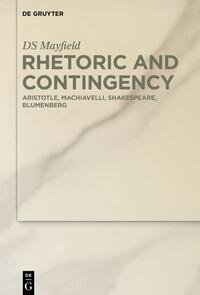
Human life is susceptible of changing suddenly, of shifting inadvertently, of appearing differently, of varying unpredictably, of being altered deliberately, of advancing fortuitously, of commencing or ending accidentally, of a certain malleability. In theory, any human being is potentially capacitated to conceive of—and convey—the chance, view, or fact that matters may be otherwise, or not at all; with respect to other lifeforms, this might be said animal’s distinctive characteristic. This state of play is both an everyday phenomenon, and an indispensable prerequisite for exceptional innovations in culture and science: contingency is the condition of possibility for any of the arts—be they dominantly concerned with thinking, crafting, or enacting. While their scope and method may differ, the (f)act of reckoning with—and taking advantage of—contingency renders rhetoricians and philosophers associates after all. In this regard, Aristotle and Blumenberg will be exemplary, hence provide the framework. Between these diachronic bridgeheads, close readings applying the nexus of rhetoric and contingency to a selection of (Early) Modern texts and authors are intercalated—among them La Celestina, Machiavelli, Shakespeare, Wilde, Fontane.